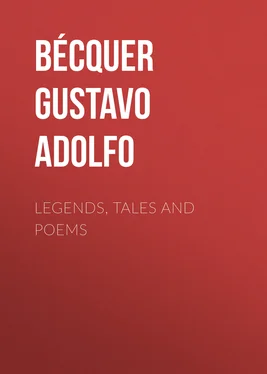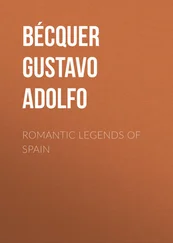Gustavo Bécquer - Legends, Tales and Poems
Здесь есть возможность читать онлайн «Gustavo Bécquer - Legends, Tales and Poems» — ознакомительный отрывок электронной книги совершенно бесплатно, а после прочтения отрывка купить полную версию. В некоторых случаях можно слушать аудио, скачать через торрент в формате fb2 и присутствует краткое содержание. Жанр: foreign_prose, literature_19, foreign_antique, на английском языке. Описание произведения, (предисловие) а так же отзывы посетителей доступны на портале библиотеки ЛибКат.
- Название:Legends, Tales and Poems
- Автор:
- Жанр:
- Год:неизвестен
- ISBN:нет данных
- Рейтинг книги:5 / 5. Голосов: 1
-
Избранное:Добавить в избранное
- Отзывы:
-
Ваша оценка:
- 100
- 1
- 2
- 3
- 4
- 5
Legends, Tales and Poems: краткое содержание, описание и аннотация
Предлагаем к чтению аннотацию, описание, краткое содержание или предисловие (зависит от того, что написал сам автор книги «Legends, Tales and Poems»). Если вы не нашли необходимую информацию о книге — напишите в комментариях, мы постараемся отыскать её.
Legends, Tales and Poems — читать онлайн ознакомительный отрывок
Ниже представлен текст книги, разбитый по страницам. Система сохранения места последней прочитанной страницы, позволяет с удобством читать онлайн бесплатно книгу «Legends, Tales and Poems», без необходимости каждый раз заново искать на чём Вы остановились. Поставьте закладку, и сможете в любой момент перейти на страницу, на которой закончили чтение.
Интервал:
Закладка:
[Footnote 1: Ramón Rodriguez Correa, Prólogo , in Obras de Becquer , vol. I, xvi.]
Early in his life in Madrid, Gustavo came under the influence of a charming young woman, Julia Espín y Guillén.[1] Her father was director of the orchestra in the Teatro Real, and his home was a rendezvous of young musicians, artists, and littérateurs . There Gustavo, with Correa, Manuel del Palacio, Augusto Ferrán, and other friends, used to gather for musical and literary evenings, and there Gustavo used to read his verses. These he would bring written on odd scraps of paper, and often upon calling cards, in his usual careless fashion.
[Footnote 1: She later married Don Benigno Quiroga Ballesteros, an illustrious engineer, congressman, minister of state, and man of public life, who is still living. She died in January, 1907.]
His friends were not slow in discovering that the tall, dark, and beautiful Julia was the object of his adoration, and they advised him to declare his love openly. But his timid and retiring nature imposed silence upon his lips, and he never spoke a word of love to her. It cannot be said, moreover, that the impression created upon the young lady by the brilliant youth was such as to inspire a return of his mute devotion. Becquer was negligent in his dress and indifferent to his personal appearance, and when Julia's friends upbraided her for her hardness of heart she would reply with some such curt and cruel epigram as this: "Perhaps he would move my heart more if he affected my stomach less."[1]
[Footnote 1: Facts learned from conversation with Don Manuel del Palacio, since deceased.
The editor of this sketch is indebted to the courtesy of the Exc mo. Sr. D. Benigno Quiroga Ballesteros and to his lately deceased wife, Doña Julia, the muse of at least some of Becquer's Rimas , for an opportunity to examine a couple of albums containing some of the poet's verse and a most interesting collection of pencil sketches, which but confirm his admiration for Becquer's artistic talent. Here is a list of the sketches:
First Album:
Lucia di Lamermoor—Eleven sketches, including frontispiece.
A dream, or rather a nightmare, in which a man is pictured in a restless sleep, with a small devil perched upon his knees, who causes to fly as a kite above the sleeper's head a woman in graceful floating garments.
A fat and jolly horned devil in the confessional box, with a confessor of the fair sex kneeling at one side, while at the extreme right two small acolytes point out to each other a suspicious looking tail that protrudes from beneath her skirts, thus stamping her as Satan's own.
A belfry window with a swinging bell, and bestriding the bell a skeleton tightly clutching the upper part of it—ringing the ánimas perhaps.
Gustavo himself seated smoking, leaning back in his chair, and in the smoke that rises a series of women, some with wings.
A nun in horror at discovering, as she turns down the covers of her bed, a merry devil.
A woman's coffin uncovered by the sexton, while a lover standing by exclaims, "¡¡Cáscaras!! ¡cómo ha cambiado!"
A scene at the Teatro Real with Señor Espin y Guillén in a small group behind the scenes, and a prima donna singing. Actors standing apart in the wings.
A visit to the cemetery. A skeleton thrusting out his head from his burial niche, and a young man presenting his card. "DIFUNTO: No recibo. VISITANTE: Pues hai ( sic ) queda la targeta ( sic )."
A fine sketch of "Eleonora," a stately form in rich fifteenth-century garb.
A number of sketches of women, knights, monks, devils, soldiers, skeletons, etc.
Second Album: Les morts pow rire, Bizarreries dédiées à Mademoiselle Julie, par G. A. Becker (sic) .
Fantastic frontispiece of skulls, bones, and leafy fronds, and two young lovers seated, sketching.
Skeletons playing battledore and shuttlecock with skulls.
A tall slim skeleton and a round short one.
Skeletons at a ball.
A skeleton widow visiting her husband's grave.
The husband returning her visit, and coming to share her lunch in the park.
A circus of skeletons, in two scenes: (1) Leaping through the hoop. (2) One skeleton balancing himself, head downward, on the head of another who is standing.
A skeleton singer on the stage.
A skeleton horse leaping a hurdle.
A skeleton drum-major with his band.
A skeleton bull-fight.
A duel between skeletons.
A tournament on skeleton horses.
A woman recently deceased, surrounded by skeletons offering their compliments. They are presented by one of their number, with hat in hand.
A balcony courting scene between skeleton lovers.
The word FIN in bones concludes the series of grotesque and uncanny sketches, which but emphasize a fact ever present in the poet's mind—that while we are in life we are in death.]
Finding his devotion to Julia unrequited, Becquer, in a rebellious mood, and having come under the influence of the charms and blandishments of a woman of Soria, a certain Casta Estéban y Navarro, contracted, in or about the year 1861, an unfortunate marriage, which embittered the rest of his life and added cares and expenses which he could ill support. He lived with his wife but a short time, during which period two sons were born to them—Gustavo, whose later career was unfortunately not such as to bring credit to the memory of his illustrious father, and, Jorge, who died young. Becquer was passionately fond of his children, and succeeded in keeping them with him after the separation from his wife. They were constantly the objects of his affectionate solicitude, and his last thoughts were for them.
About 1858 the newspaper El Contemporáneo had been founded by the able and broad-minded Jose Luis Albareda, and Correa, who was associated with the management, succeeded in obtaining for his friend a position on its staff. Becquer entered upon his new labors in 1861, and was a fairly regular contributor until the suppression of the paper. Here he published the greater part of his legends and tales, as well as his remarkable collection of letters Desde mi Celda ("From my Cell"). The following year his brother Valeriano, who up to that time had exercised his talents as a genre painter in Seville, came to join him in Madrid. He too had been unfortunate in his domestic relations, and the brothers joined in sympathy to form a new household. A period of comparative comfort seemed to open up before them. This period was of short duration, however; for Gustavo (who was never strong) soon fell ill, and was obliged to withdraw from the capital, in search of purer air, to the historic monastery of Veruela, situated on the Moncayo, a mountain in northern Spain. His brother Valeriano accompanied him, and there they passed a year in complete isolation from the rest of the world. The spur of necessity, however, compelled them both to keep to their work, and while Gustavo was writing such legends as that of Maese Pérez , and composing his fascinating Cartas desde mi Celda , Valeriano was painting Aragonese scenes such as La Vendimia ("The Vintage") or fanciful creations such as El Barco del Diablo or La Pecadora .
The next year the two brothers returned to the capital, and Gustavo, together with his friend D. Felipe Vallarino, began the publication of La Gaceta literaria , of brief but brilliant memory. During this same year and during 1863 Gustavo continued on the staff of El Contemporáneo , enriching its pages with an occasional legend of singular beauty.
At the Baths of Fitero in Navarre, whither, with his inseparable brother, he had gone to recuperate his health in the summer of 1864, Gustavo composed the fantastic legend of the Miserere , and others no less interesting. On his return from Fitero he continued in El Contemporáneo , and shortly after entered a ministerial daily, the irksome duties of which charge he bore with resignation.
Читать дальшеИнтервал:
Закладка:
Похожие книги на «Legends, Tales and Poems»
Представляем Вашему вниманию похожие книги на «Legends, Tales and Poems» списком для выбора. Мы отобрали схожую по названию и смыслу литературу в надежде предоставить читателям больше вариантов отыскать новые, интересные, ещё непрочитанные произведения.
Обсуждение, отзывы о книге «Legends, Tales and Poems» и просто собственные мнения читателей. Оставьте ваши комментарии, напишите, что Вы думаете о произведении, его смысле или главных героях. Укажите что конкретно понравилось, а что нет, и почему Вы так считаете.












